Women, Peace and Security E-News March 2017

Women stand up against nuclear weapons and for human security.
By WILPF Disarmament Programme Director Ray Acheson
WILPF staff, fellows, friends and partners participated in a campaign “On the road to banning nuclear weapons” (Photo: WILPF)
Today at the United Nations, history is being made. The majority of governments, together with international organisations and civil society groups, including WILPF, are gathering to start negotiations of a treaty banning nuclear weapons.
We are doing so without the nuclear-armed states and other states that include nuclear weapons in their security doctrines. These states -- the minority -- are refusing to participate in the UN talks and have condemned the negotiation of this treaty as destabilising the status quo. But this is exactly the point.
This process of banning nuclear weapons is a direct challenge to the patriarchal world order and patriarchal discourse.
Much of the opposition to the nuclear ban process has been highly gendered. Those talking about humanitarian consequences of nuclear weapons and calling for the prohibition of these weapons of mass destruction are accused of being divisive, polarising, ignorant and even emotional. Opponents to the ban say that they support “reasonable”, “realistic”, “practical” or “pragmatic” steps, and that anything else is irrational and irresponsible.
Most women and others will recognise this rhetorical assault. When men want to assert their power and dominance and make women (or other men) feel small and marginalised, they accuse us of being emotional, overwrought, relentless, repetitive or irrational. This technique has been employed for as long as gender hierarchies have existed.
This is also generally reflective of the traditional nuclear weapon discourse, which is full of terms with gendered meanings. That discourse continues to be mired in dichotomies such as hard versus soft security, strong versus weak, active versus passive and national security versus human security. With remarkable consistency, the masculine-identified sides of these pairs are tacitly attributed more value than the other.
Nuclear weapons are themselves loaded with symbolism -- of potency, protection and the power to “deter” through material “strength”. For many, such symbolism obscures the real point of the existence of these arms -- to destroy -- and their horrendous effects. Taking a human-focused approach to disarmament and challenging a state-centered approach to international peace and security are good first steps. An understanding of the gendered meanings and characterisations embedded in the discourse and politics of nuclear weapons will support that process.
The prohibition of nuclear weapons is something women’s groups should be able to celebrate. Women have been at the forefront of the anti-nuclear resistance since the beginning of the nuclear age. WILPF was one of the first civil society groups to condemn the bombings of Hiroshima and Nagasaki. Women were leaders in the campaign to ban nuclear weapon testing in the United States, including by collecting baby teeth to show evidence of radioactive contamination. Women led the Nuclear Freeze movement in the 1980s, calling on the Soviet Union and United States to stop the arms race. Now, women are the leading edge of the movement to ban nuclear weapons. In both governments and NGOs, women have been the most present and vocal in campaigning for a total prohibition of the bomb.
Next week and in June-July, when the negotiations at the UN will continue, women will continue to be in the forefront of the resistance against the bomb. We are leading both in the conference room and in the streets. As part of our efforts to ban nuclear weapons, WILPF is organising a public march and rally on 17 June 2017, during the midst of the second round of negotiations, to bring together an intersectional, diverse and inclusive group of people who want to see the end of the nuclear era!
You can join our Women’s March to Ban the Bomb in New York City or set up a sister march in your city and become a partner of our initiative.
It’s going to be a great time to mobilise against nuclear weapons and for human security!
Negotiations will be on at the UN from 27-31 March 2017 and 15 June-7 July 2017. To follow the negotiations, you can subscribe to WILPF’s ban treaty mailing list to receive daily updates from our Disarmament Programme Reaching Critical Will. You can also follow us on social media with the hashtag #nuclearban and the Twitter accounts @RCW and @nuclearban.
Meaningful Participation at #CSW61: #MissingVoices
By Nela Abey
Secretary-General António Guterres holds a town hall meeting with representatives of Non-Governmental Organizations associated with the sixty-first session of the Commission on the Status of Women (CSW) (Photo: UN Photo/Mark Garten)
The Commission on the Status of Women is usually a global mobilising space for women’s rights. However, this year, the US travel ban prevented the participation of many women. The US travel ban is just the tip of the iceberg and part of broader obstacles to women’s meaningful participation, which all must be overcome.
WILPF and its partners protested women’s exclusion at the CSW61. We refused to engage formally, moved our events with our partners in Syria, Libya and Yemen to Geneva, shared an open letter to ambassadors in New York and Geneva and worked with our grassroots network and partners to raise awareness of #MissingVoices at the CSW61 in diverse spaces and with a broad range of stakeholders. We also provided alternative spaces for excluded women to share their expertise and raise their voices.
The issue was raised at the highest levels. Civil society brought attention through a #NoBordersOnGenderJustice initiative (led by MADRE, Just Associates (JASS), CWGL, AWID, Urgent Action Fund, Women in Migration Network and Outright Action International), empty chairs campaign, a rally, and outreach; governments also raised the issue of women’s exclusion during negotiations. The 17 March 2017 UN Secretary General Town Hall meeting with society included an empty chair recognising women's missing voices. The final Agreed Conclusions outcome document also addressed meaningful participation of women in decision-making as a key in breaking the cycle of discrimination and violence.
A lot of work is ahead: Ongoing obstacles continue in the shape of visa rejections, sidelining on panels, lack of action on the Women, Peace and Security commitments and otherwise. To ensure that this conversation moves forward, WILPF will be holding a convening on overcoming obstacles to women’s meaningful participation at the UN in Geneva at the end of April 2017.
Join us in taking further action for change!
Find WILPF's official statement to Member States in English and Arabic here
Find more information about the WILPF April 2017 convening here
WILPF Webinar: Understanding the Causes of Multidimensional Insecurity in Yemen and Libya
Banner for the WILPF webinar “Understanding the Causes of Multidimensional Insecurity in Yemen and Libya” (Visual: WILPF)
On 23 March 2017 the Women’s International League of Peace and Freedom (WILPF) held a webinar launching an analytical study on ever-growing levels of insecurity and violence in Libya and Yemen. The webinar was well attended with participants from across the world and explored the rapidly shifting political landscape that permitted destructive economy of wars to prevail over sustainable peace and the rule of law.
WILPF planned to launch this study at the 61st Session of the Commission on the Status of Women (CSW61). However, panelists were unable to attend the forum. In this vein, taking place under the shadow of escalated discriminatory policies that limit women’s agency, the conversation allowed panelists to examine multidimensional security concerns of women in both countries and propose ways for strengthening women's participation and monitoring of its implementation by Member States and the UN.
Find more information about the WILPF webinar here
Inside the Security Council Open Debate on Modern Slavery
By Sarah Tunnell
Ilwad Elman Briefing the Security Council at the Open Debate on Forced labour, Slavery and Other Similar Practices. (Photo: Elman Peace & Human Rights Centre/Twitter)
At the March 15 Security Council Open Debate on Forced Labour, Slavery and Other Similar Practices, Member States underscored the pivotal nexus between conflict, displacement and human trafficking. Speakers emphasised countering violent extremism, improving intelligence sharing and tackling impunity as the most effective ways to address the crisis, which affects more than 21 million persons across the globe. A handful of states drew critical links between military interventions, arms trades and sexual and gender-based violence, yet the action steps most frequently offered to address trafficking centred around securitised perceptions of development.
Civil society representative Ilwad Elman, of the Elman Peace and Human Rights Center, briefed the Council via teleconference from Somalia about the devastating scale of trafficking and sexual exploitation in her country. Elman’s voice stood apart from the overarching discussion, which focused on women through the lens of victimisation and protection, rather than emphasising their agency as change-makers in society.
Find the full analysis of the Security Council open debate on Modern Slavery and Forced Labour here
An Analysis of Chapter Fourteen of the Global Study: Guidelines and Recommendations
By Alexandra Rojas
Participants of a solidarity dialogue between women activists from Bosnia and Herzegovina and Ukraine held in Sarajevo on 7-9 June 2016 convened by WILPF and The Kvinna Till Kvinna Foundation (Photo: WILPF)
The UNSCR 1325 Global Study on Women, Peace and Security calls on the United Nations, Member States, civil society and all actors to ground their understanding of conflict within the needs and concerns of women in specific situations of conflict. It also highlights persistent problems, such as the prevalence of militarisation, underrepresentation of women in official peace negotiations and perennial lack of funding for the Women, Peace and Security (WPS) Agenda.
Chapter 14 of the UNSCR 1325 Global Study summarises the main recommendations for action, which include the need to strengthen conflict prevention and demilitarisation efforts. Some of these recommendations have already contributed to a process of UN reform that is beginning to pivot away from crisis response and toward conflict prevention through the “sustaining peace” agenda, illustrating the importance of the Integrated Approach. However, there is a lot more work to be done!
Facts and Figures
Women’s participation increases the probability of a peace agreement lasting at least two years by 20 percent, and by 35 percent the probability of a peace agreement lasting 15 years (Global Study on 1325, 41-42);
A review of 47 national action plans on women, peace and security in 2014 showed that only 11 had some allocated budget (Global Study on 1325, 270);
Research shows a consistent, striking disparity between policy commitments to gender equality and women’s empowerment, and the financial allocations to achieve them (Global Study on 1325, 372);
Since 2000 annual military expenditures have increased by approximately 60 per cent, or the equivalent of 2500 years of expenditure by international disarmament and non-proliferation organisations (Global Study on 1325, 134);
- As of 2015 news media stories on peace and security-related themes from 15 conflict and post-conflict countries identified women as victims more than twice as often as men, and portrayed women as leaders only four percent of the time (Global Study on 1325, 293-294).
Recommendations
Member States, the UN and the international community should ensure that all actors, mediators, and parties to the conflict guarantee that women’s participation in talks is equal and meaningful, and barriers to their participation, whether these exist in law or in practice, are completely eliminated (Global Study on 1325, 58);
Member States should provide capacity building and support the development, financing, implementation and monitoring of NAPs in conflict-affected countries (Global Study on 1325, 58);
Member States and the UN should provide financial, technical and political support to countries to encourage educational and leadership training for men, women, boys and girls, which reinforces and supports non-violent, non-militarised expressions of masculinity (Global Study on 1325, 214);
Member States should adopt gender-responsive budgeting practices, including through consultation with civil society, as a strategy to address militarised state budgets and their destabilising impact on international peace and security and women’s rights (Global Study on 1325, 214);
- Member States should commit to doctrines and planning that takes into account the impact on women and girls of every military deployment and operation, and that considers the use of unarmed military protection as a preferable or complementary protection method (Global Study on 1325, 402).
For more information, see UN Women’s Global Study Factsheets or the entire Global Study on Women, Peace and Security.
The Women, Peace and Security Fellowship/Internship: WILPF is Accepting Applications
Our 2016 fellows participating in a peace rally in New York (Photo: WILPF)
Are you interested in peace, disarmament, and gender justice? Join our team!
The Women, Peace and Security Programme of the Women's International League for Peace and Freedom (WILPF) offers the following Fellowship/Internship opportunities through our New York City UN office:
a United Nations and Security Council Monitor (SCM) Fellowship/Internship;
a Communications Fellowship/Internship.
WILPF is looking for young professionals and academics interested in the Women, Peace and Security (WPS) Agenda in an effort to provide professional development skills and opportunities for engagement with civil society on the implementation of the WPS Agenda at the local, national, and international level.
Find the full description of the fellowship here

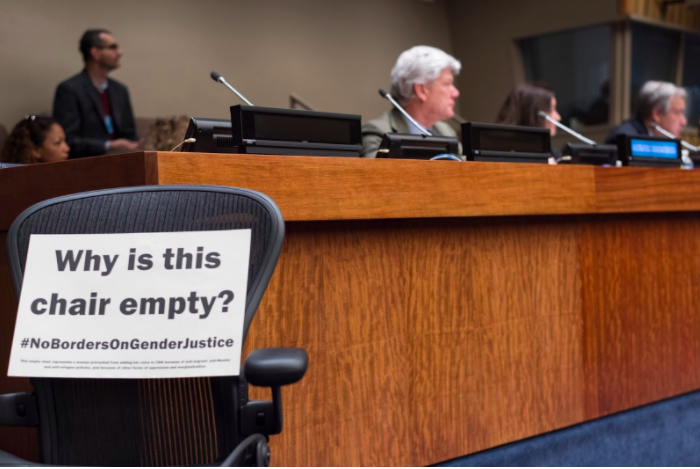
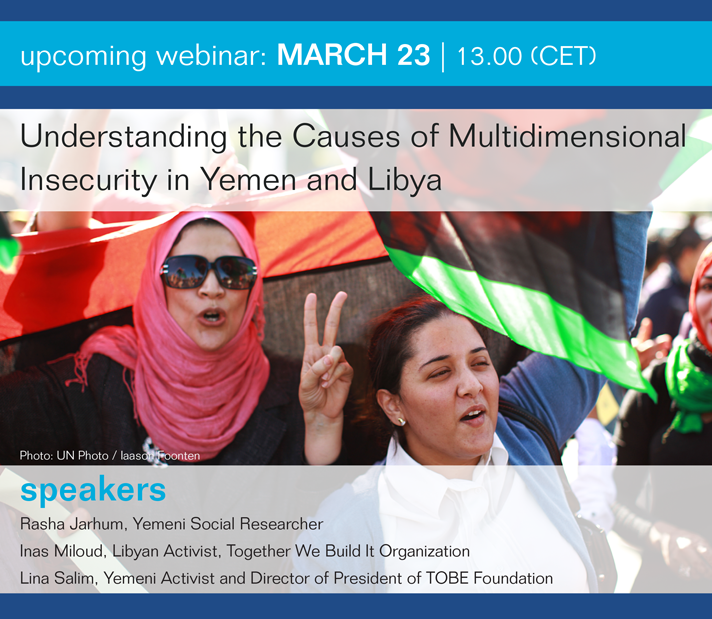
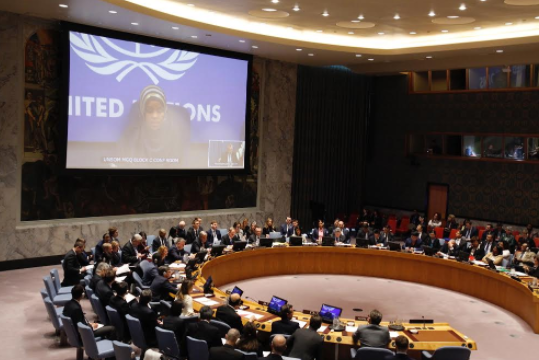
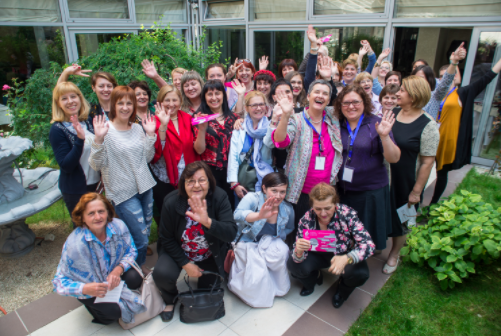
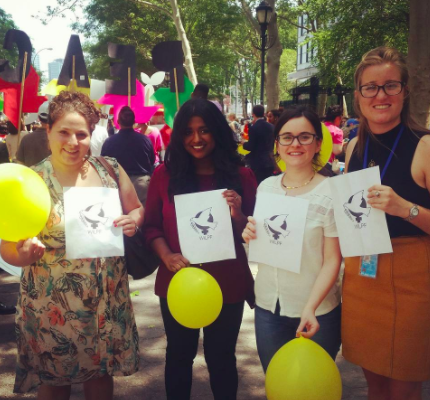
WILPF Initiatives
Monthly Action Points (MAPs): March 2017
When Important Voices Become #MissingVoices
Open Letter To the Members Of The UN Commission On The Status of Women
WILPF Calls On The UN To Uphold International Law And The UN Charter
Women’s Meaningful Participation: The Missing Ingredient At CSW61
WILPF Statement On The Report Of The Commission Of Inquiry On Syria
Understanding The Causes Of Multidimensional Insecurity In Yemen And Libya
Reports, Resources & Policy Briefs
A Guide For NGOs And Women's Human Rights Activists At The UN And CSW
Women, Peace, And Security: Closing The Security Council’s Implementation Gap
Can The UN Security Council Prevent Conflict?
Fighting The US War Machine Part Of Feminist Battle Under Trump
When No One Is Looking: 3 Years Of Healing In Democratic Republic of Congo
Status Of Women In The United Nations System
Tightening The Purse Strings: What Countering Terrorism Financing Costs Gender Equality And Security
White Book: Guidelines Of Best Practice For WPS Agenda In Cyprus
INEVAWG Statement On The 61st Session Of The United Nations Commission
External Initiatives
No Borders On Gender Justice: Platform Of Principles
#CSW61CoAction: Tweeting To Coordinate Worldwide Solidarity
Code Pink Calls For Signatures to Oppose Trump’s Proposal to Boost Pentagon Spending By $54 Billion
2017 Milead Fellows Program - A Call For Applications
New MenEngage Platform Launches In Eastern Europe And Central Asia To Engage Men And Boys For Gender Justice
IOM Develops Mobile App To Help Prevent Human Trafficking Slovakia
#TaxJustice For #WomensRights Global Days Of Action